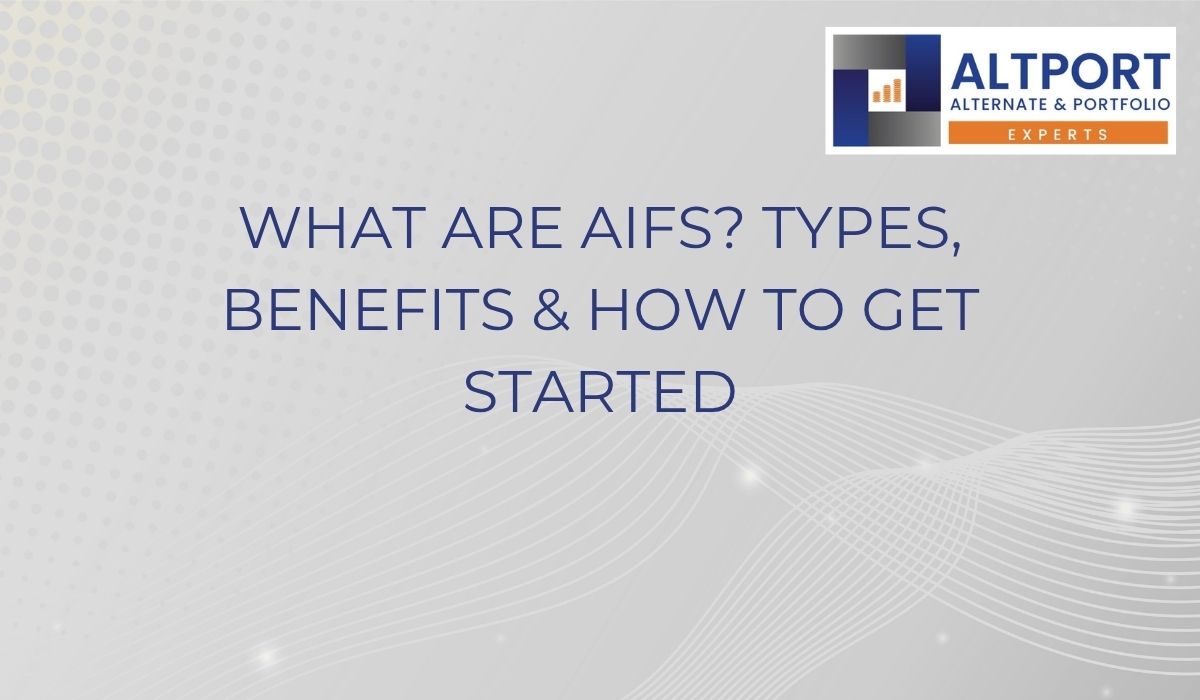Investors now continuously look for wiser and more diversified ways to increase their wealth. Stocks, bonds, and mutual funds are the traditional choices that remain in vogue, but they never provide the diversification or potential returns expected by high-net-worth individuals (HNIs). This is where alternative investment funds (AIFs) come into the picture. They are turning into one of the most favored forms of investment in India today, providing access to novel asset classes and creative strategies.
What Are AIFs?
Alternative Investment Funds, or AIFs, are privately pooled funds that pool money from individuals and invest based on a stated strategy. As opposed to mutual funds, which are available to the public at large, AIFs are generally available only to sophisticated investors, typically requiring higher minimum funds. They are overseen by the Securities and Exchange Board of India (SEBI) and are suitable for those who wish to venture beyond traditional investment options.
AIFs are versatile in nature. They can invest in a broad range of asset classes like real estate, private equity, hedge funds, venture capital, and structured products. The primary goal is to provide better risk-adjusted returns by accessing opportunities that are not usually available to conventional funds.
Types of AIFs
SEBI has divided AIFs into three broad categories depending on their approach and the type of assets they aim to target.
Category I AIFs
These funds are invested in sectors or domains that are deemed socially or economically useful. Examples include venture capital funds, infrastructure funds, angel funds, and social venture funds. They are promoted by the government and may be allowed some incentives.
Category II AIFs
These include private equity funds, debt funds, and funds of funds. They are not given special incentives, but neither are they subject to leverage constraints. They primarily aim to generate stable, long-term returns through investment in growth potential businesses or in structured debt instruments.
Category III AIFs
Category III funds employ sophisticated and varied strategies, such as hedge funds and trading in derivatives. They tend to be open-ended and focus on achieving short-term returns. These funds have more risk but also offer potential for high returns.
Benefits of Investing in AIFs
Investing in AIFs may deliver a number of benefits to investors, especially those seeking diversification and performance-based strategies.
Portfolio Diversification
AIFs enable you to tap into asset classes not possible through conventional instruments. When you invest in sectors such as private equity or real estate, you minimize your exposure to stock market fluctuations.
Potential for Superior Returns
As AIFs tend to invest in emerging sectors or cutting-edge companies, they have the potential to yield superior returns than traditional investments. Though risks are elevated, so are the payouts.
Professional Management
AIFs are overseen by seasoned fund managers with profound expertise and research-based strategies. This ensures that all investment choices are consistently in step with market opportunities and long-term wealth generation.
Flexibility in Strategies
Contrary to the fixed approach of mutual funds, AIFs are capable of adapting and innovating in their approach to investments. This makes them extremely flexible and compatible with various investor profiles.
Regulated and Transparent
Under the regulation of SEBI, AIFs have a certain degree of transparency and adherence that protect investors’ interests.
How to Start Working with AIFs
If you are looking for alternative investment funds, starting with them is not very complex and takes a couple of essential steps:
Check Your Eligibility
AIFs cater to sophisticated investors, normally for a minimum of INR 1 crore. It makes sense to check if you qualify on the financial front.
Know the Categories
Determine which category of AIF best suits your risk appetite and financial objectives. Categories I and II tend to be more appropriate for long-term wealth creation, but Category III can be appealing to those willing to take more risk for faster returns.
Select the Right Fund Manager
The outcome of your investment usually rests in the skills of the fund manager. Seek a platform or manager with a solid past performance history, open processes, and customized approaches.
Examine the Fee Structure and Terms
Each AIF has management charges, performance fees, and lock-in periods. Having knowledge about these terms prior to investing prevents surprises.
Begin with Professional Assistance
Given the intricate nature of AIFs, professional guidance is essential to selecting the right option. Having an associate to guide you through means gaining access to research, advice, and constant assistance.
Conclusion
Alternative investment funds are revolutionizing the manner in which investors diversify and accumulate wealth. They provide access to high-end opportunities in industries such as private equity, infrastructure, and real estate, with the promise of good returns. For investors who wish to venture beyond conventional channels and benefit from cutting-edge techniques, AIFs offer a very promising direction.
At ALTPORT, we offer AIF, PMS, and Gift City Fund investments through a process-oriented platform. With experienced experts and an emphasis on individualized strategies, we lead investors through each phase of their journey in a bid to ensure long-term success.

 Book A Meeting
Book A Meeting



